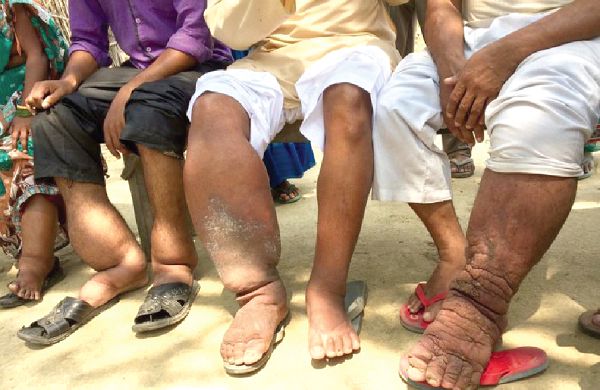The Upper East region of Ghana has recorded the highest number of cases of elephantiasis, also known as lymphatic filariasis, in the country.
According to the Ghana Health Service, there have been 2,373 confirmed cases of elephantiasis in the region, accounting for about a third of the total national cases.
Elephantiasis is a parasitic infection caused by thread-like worms transmitted through the bites of infected mosquitoes.
The infection can lead to swelling and thickening of the limbs and genitals, resulting in significant disfigurement and disability and can also cause severe pain and discomfort, as well as secondary infections.
Bright Alomatu, Desk Officer, Neglected Tropical Diseases (NTDs) programme of the Ghana Health Service said even though all 15 municipalities and districts of the Upper East Region are endemic, health workers have been able to stop the spread of elephantiasis in the region.
The Upper East region’s high number of cases, Mr. Alomatu said, could be due to several factors, including poor sanitation and hygiene practices, a condition that create a conducive environment for mosquitoes to breed and spread the infection.
“The risk is very high where we have transmission ongoing because the mosquitoes bite everybody. So once the parasite is in the system and the mosquitoes are picking and spreading, then the likelihood of you getting it is very high.”
He was speaking during a stakeholder’s sensitization held in Bolgatanga on measures to adopt and advocate to address concerns confronting patients of the disease.
According to Mr. Alomatu, health workers and volunteers were also trained since 2016 across all regions of the country, and that had contributed to stopping the transmission of the disease in 109 districts.
He said the disease was mapped in 1999 and out of the 261 districts across the country, 116 were identified as endemic of elephantiasis with only regions such as Ashanti, Ahafo, Volta, and Oti regions being non-endemic.
“We’ve trained 2,100 patients on how to manage their conditions so that they can see an improvement of the condition of the leg or whichever that is swollen so that it will not swell further and they will not also be going through acute inflammation”, he added.
He mentioned areas such as the legs, hands, breasts of women, penis, vulva, and scrotum as parts mostly affected by the condition with the commonness in Ghana being the hands, legs, and scrotum.
The sensitization was organized with support from the Ghana Health Service, American Leprosy Mission, and the Christian Connection for International Health.
Mr Solomon Atinbire, Programme Manager for American Leprosy Mission said the rationale for organizing the sensitization was to equip some individuals to serve as game changers to advocate for the inclusion of patients with elephantiasis cases in Ghana’s Livelihood Empowerment Against Poverty (LEAP) programme.
“That would help them [patients] to get some monies to register for health insurance coverage so that anytime they are taken ill, they can visit the health facilities for care”, he stated.
Mr. Atinbire explained that the condition of elephantiasis made the patients vulnerable to engage in any economic activities or access health services, hence the decision to form a committee in all districts and municipalities of the region to advocate for the welfare of the patients with elephantiasis.
Dr. Josephat Nyuzaghl, the Upper East Regional Deputy Health Director in charge of Public Health said it is expected that the advocacy groups would engage the assemblies for the patients to benefit from some of the disability funds of the assemblies.
Latest Stories
-
Black Stars could miss key players for 2025 Unity Cup – Dr Randy Abbey
52 minutes -
Pyramids grab late equaliser in African Champions League final
2 hours -
EU calls for ‘respect’ after Trump threatens 50% tariffs
2 hours -
Ronaldo ‘could play’ in Club World Cup – Infantino
2 hours -
Amorim tells Garnacho he can leave Man Utd
2 hours -
Djokovic makes more history with 100th singles title
2 hours -
Ten Hag set to replace Alonso as Leverkusen manager
2 hours -
Salis’ Sunderland secure Premier League return
2 hours -
Assin Fosu chiefs and elders bless TGMA Unsung Artiste of The Year, Yaw Darling
3 hours -
Middle-aged, 2 children trapped in their home after a fig tree sealed their frontage doors
4 hours -
Roots of resistance: The climate cost of cutting Accra’s trees
4 hours -
Reimagining Informality: Harnessing the Urban potential of street vending in Ghana
4 hours -
Former Yendi MP Dr Farouk Mahama donates towards funeral of late Mion chief
5 hours -
Ghana Gas board pledges accountability and staff support during operational tour
5 hours -
Burkina Faso’s uprising is a rebirth, not rebellion – Ras Mubarak
5 hours

